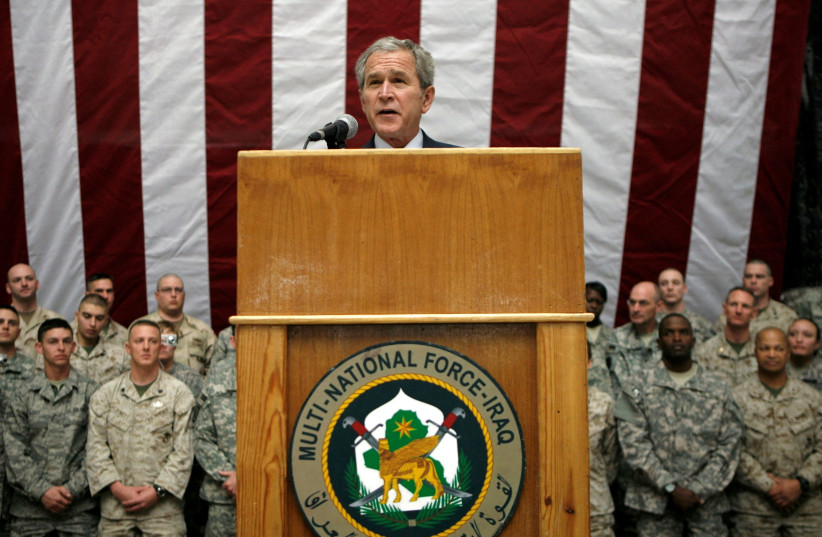A surprise trip by US President Joe Biden to Kyiv on Monday will send a message that the US fully backs Ukraine and will continue to do what is necessary to reinforce Kyiv’s ability to resist’s Russia’s year-long invasion. The visit is as symbolic as it is important. It comes after the Munich Security Conference already had showcased European backing of Ukraine and also comes amid concerns that China could aid Russia in its war.
A closely held secret
The most important part of the trip is that it continues to showcase the point Biden has made during his presidency that “America is back.” The trip was clearly a closely held secret and it came as the US President was supposed to be going to Poland during the one-year anniversary of the invasion of Ukraine. Poland would have been an easier visit, but the importance of being in Ukraine on the eve of the year's anniversary is clearly a key moment in history.
This will anger Russia and also send a message to Moscow that its aggression is unacceptable. In some ways, this brings the US role in the world back to where it was in the early 1990s when then US President George H.W. Bush pushed for a new world order.
At the time he had spoken about a new era “freer from the threat of terror, stronger in the pursuit of justice, and more secure in the quest for peace. An era in which the nations of the world, East and West, North and South, can prosper and live in harmony. Today that new world is struggling to be born, a world quite different from the one we've known. A world where the rule of law supplants the rule of the jungle,” he said in 1990. At the time Bush had just met with the Russian leader Gorbachev, now decades later it’s important to put that in perspective.
Bush at the time saw Saddam Hussein’s invasion of Kuwait as the first crisis of this new era he was suggesting was being born.

“This is the first assault on the new world that we seek, the first test of our mettle. Had we not responded to this first provocation with clarity of purpose, if we do not continue to demonstrate our determination, it would be a signal to actual and potential despots around the world. America and the world must defend common vital interests — and we will. America and the world must support the rule of law — and we will,” he said at the time.
Today we face a very different world. Russia and China openly challenge the US. Russia has said it wants to reduce the US role in the world and build itself up as part of a multipolar world, one in which the US is not a hegemon. US leaders in the last two decades have also wondered about America’s role in the world. Can I intervene everywhere and police the world? Clearly it cannot.
Therefore it has to focus on goals. What kinds of goals are these? Is it “by, with and through” as the US did in Syria to defeat ISIS, working with local, mostly Kurdish, forces. Or is it what is being done in Ukraine, arming a democracy to defend itself. American leaders of the last century would have agreed with this agenda of arming the world’s democracies. Woodrow Wilson would have liked this and also FDR and JFK. Each spelled out a vision of the US as a the armorer of democracies, or making the world safe for democracy.
John F. Kennedy noted in September 1960 “the great question confronting the country today is can the world exist half slave and half free. Will it begin to move in the direction of freedom - will it move in the direction of freedom in the next half-decade? Will it move in the direction of slavery? Or will the world be destroyed in another nuclear war? That is the question which faces our generation, and it is the most solemn question that this nation or the world has ever faced.”
Kennedy channeled the same impulses that found the way to Bush decades later in 1990, and from there to Biden’s trip to Ukraine. These are key milestones over a century, since the US went to war in Europe in the First World War, in which the US has defined itself as a global power and defined its role in the world. This is a role that some critics don’t agree with, they think the US needs to be more isolationist and not “provoke” Russia by supporting Ukraine.
However, the increasing aggression of Russia and the rise of China shows that if the US walks away from any region then the vacuum will be filled with authoritarians and adversaries, whether China or Russia writ large, or Iran and regional powers. The era of counter-insurgency and the global war on terror is now over. Biden’s presidency helped end that era by leaving Afghanistan. Now, going to Kyiv, he has shown how the US has pivoted from the small wars that defined the era 1990-2022, to larger conventional conflicts.
